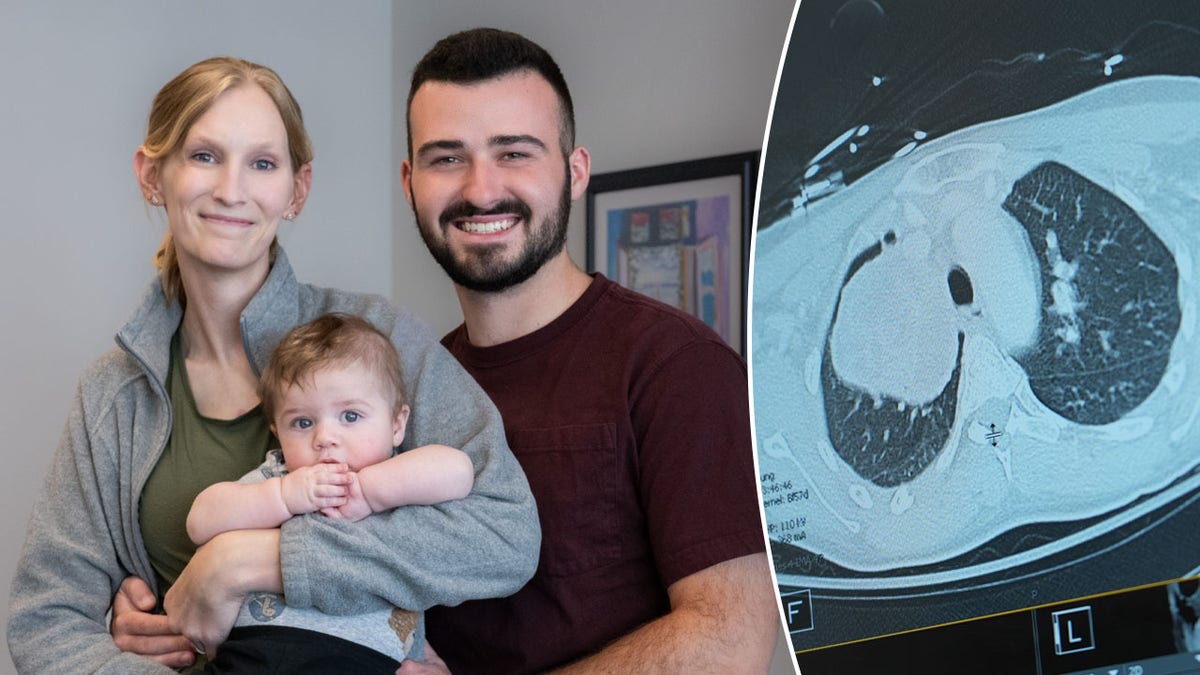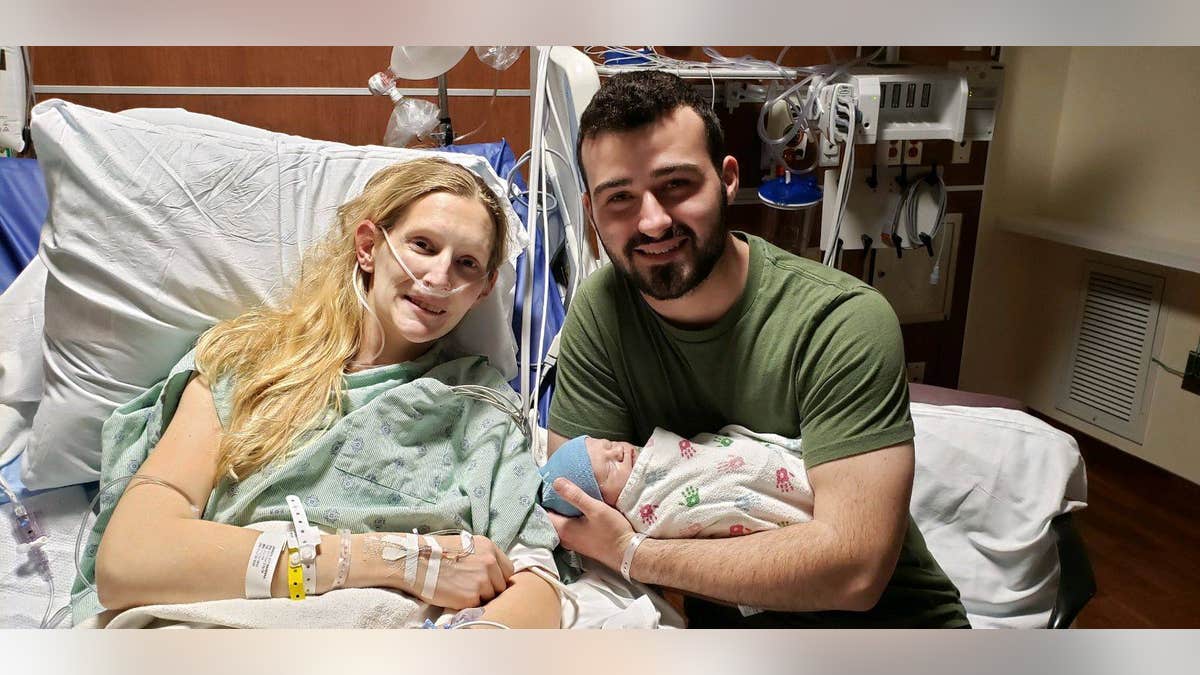A Chicago woman was just weeks away from giving birth when a nagging cough led to a shocking medical discovery.
MaKenna Lauterbach, then 26 years old, began experiencing severe coughing fits in the last three months of her pregnancy.
“They would be so severe that I would become winded and nauseous to the point of vomiting,” she told Fox News Digital.
PREGNANT WOMAN WITH BRAIN CANCER REFUSES ABORTION
Lauterbach, who lives on a farm in Washburn, Illinois, also began noticing shortness of breath while tending to her horses and goats.
“I give hay to the horses every morning and noticed how winded I was becoming with a dry cough,” she said. “My body felt like I just ran two miles, when, in reality, I had only walked to the barn and back.”

MaKenna Lauterbach, pictured with her husband, Parker, and new baby, Colter, was diagnosed with stage 3 melanoma. (Northwestern Medicine)
Some doctors dismissed Lauterbach’s symptoms, she said, repeatedly telling her, “It’s because you are pregnant.”
Eventually, though, when the coughing led to vomiting, doctors performed scans and detected a large, grapefruit-sized tumor in her middle chest cavity and right lung, which was completely blocking the artery to the right lung.
PREGNANT MOM WITH CANCER DEFIED DOCTORS’ ABORTION GUIDANCE
“It’s extremely rare to see this type of tumor invading into the major blood vessels of the heart,” said Chris Mehta, M.D. — a cardiac surgeon with the Northwestern Medicine Bluhm Cardiovascular Institute who specializes in complex heart reconstruction — in a press release.
“It’s extremely rare to see this type of tumor invading into the major blood vessels of the heart.”
“We may see something like this once every few years.”
The tumor had put Lauterbach — and her baby — into respiratory distress.
‘In real trouble’
Lauterbach was flown to Northwestern Memorial Hospital in Chicago, where a large medical team was waiting for her.
“MaKenna was in real trouble, and we had to act quickly – this wasn’t something that could wait for Monday morning,” said Lynn Yee, M.D., maternal-fetal medicine specialist at Northwestern Medicine, in the release.

Though he was born three weeks early, little Colter is a thriving, happy baby boy today. “As for myself, I am still healing, emotionally and physically,” said Lauterbach. (MaKenna Lauterbach)
“When you’re pregnant with a baby that’s nearly full term, your lungs already aren’t functioning at full capacity, and when you add a huge tumor on top of it, you run the risk of having respiratory collapse and cardiac arrest.”
The baby was not tolerating the contractions well and Lauterbach’s blood pressure was plummeting.
THE YEAR IN CANCER: ADVANCES MADE IN 2024, PREDICTIONS FOR 2025
The team performed an emergency cesarean section — and on Easter Sunday, a healthy baby boy, Colten, was born.
‘Blindsiding news’
After the delivery, it was time to address the tumor.
“The tumor was sitting on top of MaKenna’s heart and extended into the right lung, impacting all three lobes and the entire main trunk of the pulmonary artery,” said Kalvin Lung, M.D., a thoracic surgeon with the Northwestern Medicine Canning Thoracic Institute, in the release.
Doctors performed a biopsy and diagnosed Lauterbach with stage 3 melanoma.

The Lauterbach family lives on a farm in Washburn, Illinois. MaKenna Lauterbach first experienced severe coughing fits and shortness of breath when tending to the horses and goats. (MaKenna Lauterbach)
The doctors believe she may have had a melanoma on her skin at some point, and that “a cell or two escaped” and began growing inside her body.
“It was truly blindsiding news,” Lauterbach told Fox News Digital. “When I first got the diagnosis, I went through a roller coaster of emotions.”
“I was grieving the birth plan I had spent months preparing, while also dealing with the news of my unexpected diagnosis.”
After first feeling relief at having an answer, she said she felt some anger that her symptoms had been dismissed earlier. Then there was the fear of the cancer itself.
“Because of the tumor, the delivery happened so quickly. I was grieving the birth plan I had spent months preparing, while also dealing with the news of my unexpected diagnosis,” she said.
“My situation was serious, and while my clinical team was working on a plan to treat my cancer, it was comforting to know that the NICU nurses [at Northwestern] were taking such wonderful care of our son.”
Taking life-saving action
The team at Northwestern recommended that Lauterbach undergo three cycles of immunotherapy before surgery, which helped shrink her tumor by 30%.
Dr. Lung and Dr. Mehta removed Lauterbach’s entire right lung, parts of the main pulmonary artery and her lymph nodes.

The Lauterbach family is pictured with, left to right, Dr. Kalvin Lung, registered nurse Mary Schuessler and Dr. Lynn Yee. (Northwestern Medicine)
“The surgery was risky relative to other cancer surgeries due to the need for cardiopulmonary bypass, and the need to repair the main artery going to both lungs, but it was done under very safe conditions with well-proven techniques,” Dr. Lung told Fox News Digital.
“We were concerned that even with the extent of surgery, we would not be able to completely remove the tumor,” he went on.
CLICK HERE TO GET THE FOX NEWS APP
If the tumor had grown just slightly more into the main artery going to the lungs, or if it had involved the heart, it would have been a different outcome.
But the surgery was a success, and Lauterbach’s latest scans showed no evidence of metastatic melanoma.

Colter Lauterbach is pictured with Santa ahead of his first Christmas. (MaKenna Lauterbach)
“Her outcome was very good,” Dr. Lung told Fox News Digital. “She has recovered from surgery almost entirely, and her main issue is shortness of breath, which is a consequence of only having one lung.”
“In terms of cancer prognosis, we expect it to be quite good, given that the entire tumor responded to the immunotherapy treatment she received.”
‘New normal’
Today, though he was born three weeks early, little Colter Lauterbach is a thriving, happy baby boy.
“As for myself, I am still healing, emotionally and physically,” said MaKenna Lauterbach. “My lung capacity is getting close to ‘the new normal’ for me and I’m finally starting to return to some sort of normal routine.”
“There are some days when the bad memories and the unknowns haunt my thoughts.”
Looking ahead, Lauterbach will continue immunotherapy treatments for one year, and the doctors will continue to monitor CT scans to ensure the cancer doesn’t come back.
CLICK HERE TO SIGN UP FOR OUR HEALTH NEWSLETTER
Her cancer is currently considered a “stable disease,” doctors say, which means no new tumors have appeared.
The new mother, who turned 27 in October, said she is looking forward to her son’s first Christmas on the farm.

MaKenna and Parker Lauterbach are pictured with their son, Colter, after he was born by emergency cesarean section. (MaKenna Lauterbach)
“Emotionally, I try my best not to let reality weigh on me, but there are some days when the bad memories and the unknowns haunt my thoughts,” she said.
“Colter and my wonderful husband, Parker, are what have given me the strength to make it through everything.”
For more Health articles, visit www.foxnews.com/health
For other women, Lauterbach emphasized the importance of “knowing your body.”
She advised, “If you know something isn’t right, don’t take ‘I don’t know’ for an answer. Find someone who will take your concerns seriously and would rather do extra testing just in case, as opposed to missing something life-threatening.”
